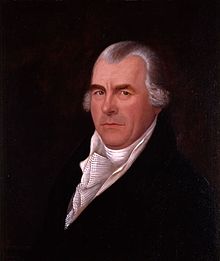Elijah Brigham | |
|---|---|
 | |
| Member of the U.S. House of Representatives from Massachusetts | |
| In office March 4, 1811 – February 22, 1816 | |
| Preceded by | Abijah Bigelow |
| Succeeded by | Benjamin Adams (politician) |
| Constituency | 11th district (1811–15) 10th district (1815–16) |
| Member of the Massachusetts House of Representatives | |
| In office 1791-1793 | |
| Member of the Massachusetts Senate | |
| In office 1796 1798 1801-1805 1807-1810 | |
| Personal details | |
| Born | July 7, 1751 Westborough, Province of Massachusetts Bay, British America (now Northborough) |
| Died | February 22, 1816 (aged 64) Washington, D.C., U.S. |
| Resting place | Congressional Cemetery |
| Political party | Federalist |
| Alma mater | Dartmouth College |
Elijah Brigham (July 7, 1751 – February 22, 1816) was a U.S. Representative from Massachusetts.
Brigham was born in Westborough (now Northborough) in the Province of Massachusetts Bay, son of Colonel Levi Brigham and Susanna (Grout) Brigham. He was a descendant of Thomas Brigham and Edmund Rice, early immigrants to Massachusetts Bay Colony.[1] Brigham was graduated from Dartmouth College, Hanover, New Hampshire, in 1778. He studied law, but did not practice. He engaged in mercantile pursuits at Westborough. He served as member of the State house of representatives 1791–1793. He served as justice of the court of common pleas 1795–1811. He served in the State senate in 1796, 1798 from 1801 to 1805, and 1807–1810. He served as a state councilor in 1799, 1800, and 1806.
Brigham was elected as a Federalist to the Twelfth, Thirteenth, and Fourteenth Congresses and served from March 4, 1811, until his death in Washington, D.C., February 22, 1816. He was interred in the Congressional Cemetery.
Brigham was elected a member of the American Antiquarian Society in 1813.[2]
- ^ "Elijah Brigham (1751-1816)". Edmund Rice (1638) Association. Archived from the original on March 7, 2016. Retrieved May 13, 2012.
- ^ American Antiquarian Society Members Directory